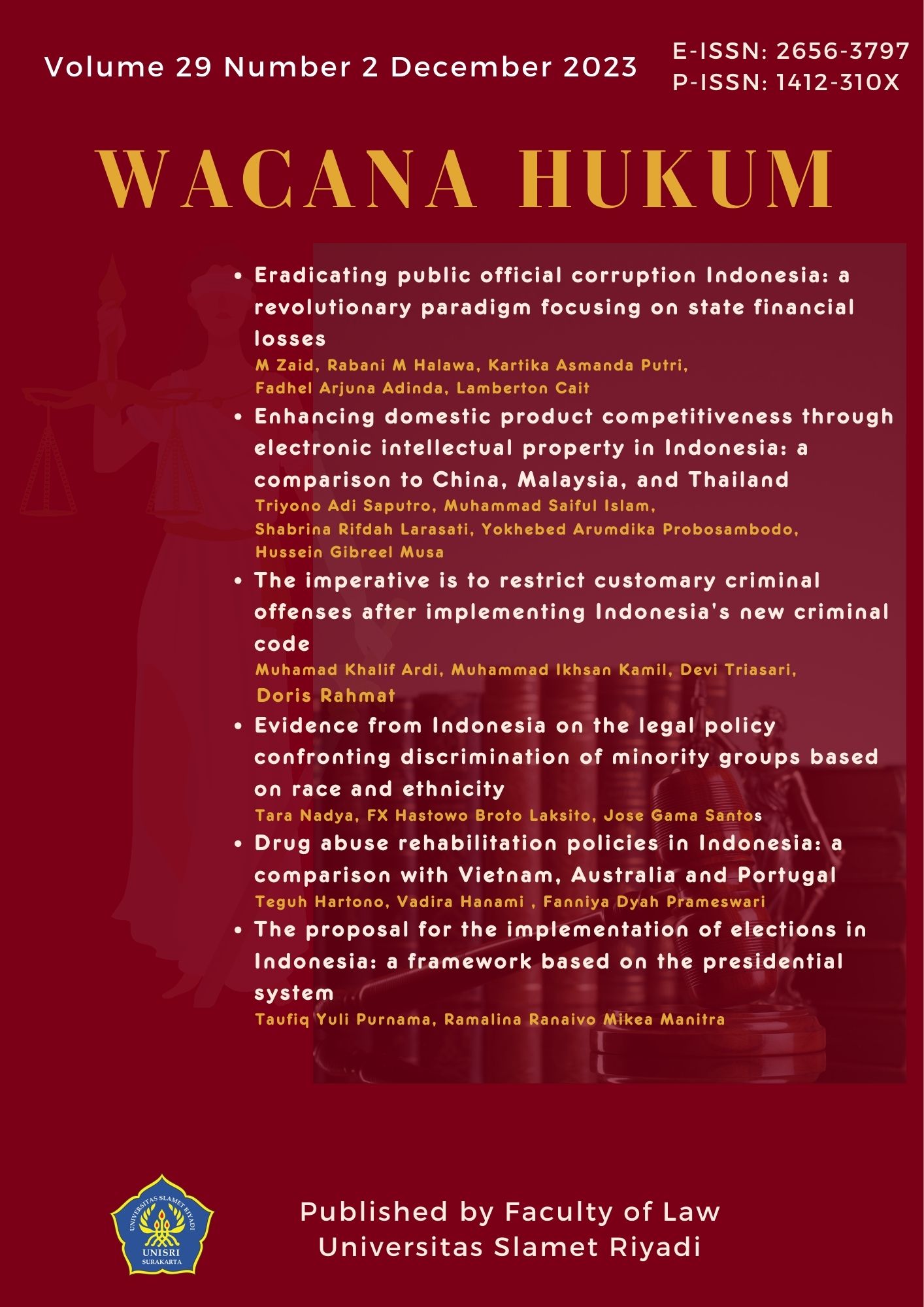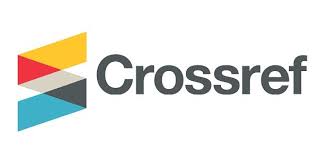Eradicating public official corruption Indonesia: a revolutionary paradigm focusing on state financial losses
DOI:
https://doi.org/10.33061/wh.v29i2.9564Keywords:
Corruption; Abuse of Authority; Government OfficialsAbstract
This research explores additional ways to eliminate corruption caused by authority abuse that hurts public finances. The present paradigm of corruption eradication in Indonesia still focuses on punishment, disregarding one of the Anti-Corruption Law's goals, state financial loss restitution. This research is normative, statutory, conceptual, and case-based. The results show that the administrative law approach to eradicating criminal acts of corruption due to government official abuse of authority focuses more on returning state losses through initial supervision by internal government agencies, such as the Government Internal Supervisory Apparatus. APIP has direct prosecution and compensation powers. The Supervisory Agency (BPK) finds state financial losses, it is better to take administrative action to recover them by communicating with APIP for time efficiency in eradicating corruption and recovering state losses. Third, sanctions in the authority that results in state financial losses are contained in Article 20 Juncto 21 of Law Number 30 of 2014 concerning governance, which only provides administrative sanctions of dismissal and does not require government officials to return state financial losses.
References
Addink, G H, and J B J M Ten Berge, ‘Study on Innovation of Legal Means for Eliminating Corruption in the Public Service in the Netherlands’, Electronic Journal of Comparative Law, 11.1 (2007), 1–34
Akbar, Reynaldi Dwi Kusuma, and Yeni Widowaty, ‘Pertimbangan Hakim Menjatuhkan Sanksi Dalam Tindak Pidana Suap Di Bidang Pengadaan Barang Dan Jasa’, Indonesian Journal of Criminal Law and Criminology (IJCLC), 3.2 (2022), 90–102 <https://doi.org/10.18196/ijclc.v3i2.15525>
Alfada, Anisah, ‘The Destructive Effect of Corruption on Economic Growth in Indonesia: A Threshold Model’, Heliyon, 5.10 (2019), e02649 <https://doi.org/https://doi.org/10.1016/j.heliyon.2019.e02649>
Arifardhani, Yoyo, ‘Country Independence Of State-Owned Enterprises: Relationship Between Private Law And Public Law’, Veteran Law Review, 1.1 (2018), 50–71
Chen, Yunsen, Limei Che, Dengjin Zheng, and Hong You, ‘Corruption Culture and Accounting Quality’, Journal of Accounting and Public Policy, 39.2 (2020), 106698 <https://doi.org/https://doi.org/10.1016/j.jaccpubpol.2019.106698>
Eddyono, Luthfi Widagdo, ‘Penyelesaian Sengketa Kewenangan Lembaga Negara Oleh Mahkamah Konstitusi’, Jurnal Konstitusi, 7.3 (2016), 001 <https://doi.org/10.31078/jk731>
Faqih, Mariyadi, ‘Nilai-Nilai Filosofi Putusan Mahkamah Konstitusi Yang Final Dan Mengikat’, Jurnal Konstitusi, 7.3 (2016), 097 <https://doi.org/10.31078/jk734>
Fernando, Zico Junius, Beni Kurnia Illahi, Yagie Sagita Putra, and Ikhbal Gusri, Deep Anti-Corruption Blueprint Mining, Mineral, and Coal Sector in Indonesia, Cogent Social Sciences, 2023, IX <https://doi.org/10.1080/23311886.2023.2187737>
Ferris, Stephen P, Jan Hanousek, and Jiri Tresl, ‘Corporate Profitability and the Global Persistence of Corruption’, Journal of Corporate Finance, 66 (2021), 101855 <https://doi.org/https://doi.org/10.1016/j.jcorpfin.2020.101855>
Georgescu, Maria-Ana, ‘Unethical Aspects and the Recent Manifestation of Corruption in Romanian Public Administration’, Procedia Economics and Finance, 15 (2014), 452–58 <https://doi.org/https://doi.org/10.1016/S2212-5671(14)00480-8>
Goel, Rajeev K, and James W Saunoris, ‘Corrupt Thy Neighbor? New Evidence of Corruption Contagion from Bordering Nations’, Journal of Policy Modeling, 44.3 (2022), 635–52 <https://doi.org/https://doi.org/10.1016/j.jpolmod.2022.05.004>
Grossi, Giuseppe, and Daniela Pianezzi, ‘The New Public Corruption: Old Questions for New Challenges’, Accounting Forum, 42.1 (2018), 86–101 <https://doi.org/https://doi.org/10.1016/j.accfor.2016.05.002>
Halimatu Hira, Rr, Yolanda Savira, and Yunika Tresia, ‘Pemberantasan Tindak Pidana Suap Di Sektor Pertambangan Melalui Penguatan Kerja Sama Lembaga Penegak Hukum Di Indonesia’, Jurnal Anti Korupsi, 3.2 (2021), 1–20 <https://doi.org/10.19184/jak.v3i2.32300>
Hermanto, Bagus, ‘Penguatan Pengaturan Kelembagaan Badan Pembinaan Ideologi Pancasila, Perlukah?’, Jurnal Legislasi Indonesia, 18.2 (2021), 204 <https://doi.org/10.54629/jli.v18i2.742>
Hidayat, Shubhan Noor, Lego Karjoko, and Sapto Hermawan, ‘Discourse on Legal Expression in Arrangements of Corruption Eradication in Indonesia’, JOURNAL of INDONESIAN LEGAL STUDIES, 5.2 (2020), 391–418 <https://doi.org/10.15294/jils.v5i2.40670>
Ifrani, Ifrani, ‘Grey Area Antara Tindak Pidana Korupsi Dengan Tindak Pidana Perbankan’, Jurnal Konstitusi, 8.6 (2016), 993 <https://doi.org/10.31078/jk866>
Illahi, Beni Kurnia, and Muhammad Ikhsan Alia, ‘Pertanggungjawaban Pengelolaan Keuangan Negara Melalui Kerja Sama BPK Dan KPK’, Integritas, 3.2 (2017), 37 <https://doi.org/10.32697/integritas.v3i2.102>
Januarsyah, Mas Putra Zenno, ‘Penerapan Asas Ultimum Remidium Terhadap Tindak Pidana Korupsi Yang Terjadi Di Lingkungan BUMN Persero’, Wawasan Yuridika, 1.1 (2017), 24–34
———, ‘The Implementation of Ultimum Remedium Principle in Criminal Case of Corruption’, Jurnal Yudisial, 10.3 (2017), 257–76 <https://doi.org/10.29123/jy.v10i3.266>
Jasa, Gilang Prama, and Ratna Herawati, ‘Dinamika Relasi Antara Badan Pemeriksa Keuangan Dan Dewan Perwakilan Rakyat Dalam Sistem Audit Keuangan Negara’, Law Reform, 13.2 (2017), 189 <https://doi.org/10.14710/lr.v13i2.16155>
Juwita, Ratna, ‘Good Governance and Anti-Corruption: Responsibility to Protect Universal Health Care in Indonesia’, Hasanuddin Law Review, 4.2 (2018), 162–80 <https://doi.org/10.20956/halrev.v4i2.1424>
Kuswanto, Kuswanto, ‘Consistency of the Presidential System in Indonesia’, Sriwijaya Law Review, 2.2 (2018), 170 <https://doi.org/10.28946/slrev.vol2.iss2.67.pp170-182>
Locatelli, Giorgio, Giacomo Mariani, Tristano Sainati, and Marco Greco, ‘Corruption in Public Projects and Megaprojects: There Is an Elephant in the Room!’, International Journal of Project Management, 35.3 (2017), 252–68 <https://doi.org/https://doi.org/10.1016/j.ijproman.2016.09.010>
Márquez, Daniel, ‘Mexican Administrative Law Against Corruption: Scope and Future’, Mexican Law Review, 8.1 (2015), 75–100 <https://doi.org/10.1016/j.mexlaw.2015.12.004>
Nunkoo, Robin, Manuel Alector Ribeiro, Vivek Sunnassee, and Dogan Gursoy, ‘Public Trust in Mega Event Planning Institutions: The Role of Knowledge, Transparency and Corruption’, Tourism Management, 66 (2018), 155–66 <https://doi.org/https://doi.org/10.1016/j.tourman.2017.11.010>
Pane, Musa Darwin, and Diah Pudjiastuti, ‘The Legal Aspect of New Normal and the Corruption Eradication in Indonesia’, Padjadjaran Jurnal IImu Hukum, 7.2 (2020), 181–206
Paranata, Ade, ‘The Miracle of Anti-Corruption Efforts and Regional Fiscal Independence in Plugging Budget Leakage: Evidence from Western and Eastern Indonesia’, Heliyon, 8.10 (2022), e11153 <https://doi.org/https://doi.org/10.1016/j.heliyon.2022.e11153>
Prabowo, Hendi Yogi, ‘Re-Understanding Corruption in the Indonesian Public Sector through Three Behavioral Lenses Hendi’, Facilities, 35.6 (2015), 925–45 <https://doi.org/10.1108/JFC-08-2015-0039>
Prabowo, Hendi Yogi, Jaka Sriyana, and Muhammad Syamsudin, ‘Forgetting Corruption: Unlearning the Knowledge of Corruption in the Indonesian Public Sector’, Journal of Financial Crime, 25.1 (2018), 28–56 <https://doi.org/10.1108/JFC-07-2016-0048>
Rasdi, Rasdi, Pujiyono Pujiyono, Nur Rochaeti, and Rehulina Rehulina, ‘Reformulation of the Criminal Justice System for Children in Conflict Based on Pancasila Justice’, Lex Scientia Law Review, 6.2 (2022), 479–518 <https://doi.org/10.15294/lesrev.v6i2.58320>
Rian Saputra and Silaas Oghenemaro Emovwodo, ‘Indonesia as Legal Welfare State : The Policy of Indonesian National Economic Law’, Journal of Human Rights, Culture and Legal System, 2.1 (2022), 1–13 <https://doi.org/10.53955/jhcls.v2i1.21>
Rini, Nicken Sarwo, ‘Penyalahgunaan Kewenangan Administrasi Dalam Undang Undang Tindak Pidana Korupsi’, Jurnal Penelitian Hukum De Jure, 18.2 (2018), 257 <https://doi.org/10.30641/dejure.2018.v18.257-274>
Rosyadi, Muhammad Imron, ‘Wewenang Badan Pemeriksa Keuangan Dan Badan Pengawasan Keuangan Dan Pembangunan Dalam Menilai Kerugian Keuangan Negara’, Mimbar Keadilan, 2016, 26 <https://doi.org/10.30996/mk.v0i0.2206>
Roza, Nelvia, ‘Problematika Penentuan Status Keuangan Negara Dalam Badan Usaha Milik Negara Persero’, Jurnal Lex Renaissance, 7.1 (2022), 41–54 <https://doi.org/10.20885/jlr.vol7.iss1.art4>
Ryvkin, Dmitry, and Danila Serra, ‘Corruption and Competition among Bureaucrats: An Experimental Study’, Journal of Economic Behavior & Organization, 175 (2020), 439–51 <https://doi.org/https://doi.org/10.1016/j.jebo.2017.12.026>
Sabani, Alvedi, Mohamed H Farah, and Dian Retno Sari Dewi, ‘Indonesia in the Spotlight: Combating Corruption through ICT Enabled Governance’, Procedia Computer Science, 161 (2019), 324–32 <https://doi.org/https://doi.org/10.1016/j.procs.2019.11.130>
Salsabila, Salsabila, and Slamet Tri Wahyudi, ‘Peran Kejaksaan Dalam Penyelesaian Perkara Tindak Pidana Korupsi Menggunakan Pendekatan Restorative Justice’, Masalah-Masalah Hukum, 51.1 (2022), 61–70 <https://doi.org/10.14710/mmh.51.1.2022.61-70>
Saputra, Rian, ‘Pergeseran Prinsip Hakim Pasif Ke Aktif Pada Praktek Peradilan Perdata Perspektif Hukum Progresif’, Wacana Hukum, 25.1 (2019), 10–18
Saputra, Rian, Muhammad Khalif Ardi, Pujiyono Pujiyono, and Sunny Ummul Firdaus, ‘Reform Regulation of Novum in Criminal Judges in an Effort to Provide Legal Certainty’, JILS (JOURNAL OF INDONESIAN LEGAL STUDIES), 6.2 (2021), 437–82 <https://doi.org/10.15294/jils.v6i2.51371>
Saputra, Rian, Josef Purwadi Setiodjati, and Jaco Barkhuizen, ‘Under-Legislation in Electronic Trials and Renewing Criminal Law Enforcement in Indonesia (Comparison with United States)’, JOURNAL of INDONESIAN LEGAL STUDIES, 8.1 (2023), 243–88 <https://doi.org/10.15294/jils.v8i1.67632>
Saputra, Rian, M Zaid, and Silaas Oghenemaro, ‘The Court Online Content Moderation : A Constitutional Framework’, Journal of Human Rights, Culture and Legal System, 2.3 (2022), 139–48 <https://doi.org/10.53955/jhcls.v2i3.54>
Saputra, Rian, M Zaid, Pujiyono Suwadi, Jaco Barkhuizen, and Tiara Tiolince, ‘Reconstruction of Chemical Castration Sanctions Implementation Based on the Medical Ethics Code (Comparison with Russia and South Korea)’, Lex Scientia Law Review, 7.1 (2023), 61–118 <https://doi.org/10.15294/lesrev.v7i1.64143>
Silal, Prakrit, and Debashis Saha, ‘Impact of National E-Participation Levels on Inclusive Human Development and Environmental Performance: The Mediating Role of Corruption Control’, Government Information Quarterly, 38.4 (2021), 101615 <https://doi.org/https://doi.org/10.1016/j.giq.2021.101615>
Subanrio, and Arie Elcaputra, ‘Penataan Kedudukan Dan Kewenangan Majelis Permusyawaratan Rakyat Republik Indonesia’, Supremasi Hukum: Jurnal Kajian Ilmu Hukum, 30.1 (2021), 66–79
Susanto, Sri Nur Hari, ‘Merekonstruksi Sistem Hukum Administratif Menuju Hukum Yang Melayani’, Masalah Masalah Hukum, 44.2 (2015)
Syahril, Syahril, Mohd Din, and Mujibussalim Mujibussalim, ‘Penerapan Undang-Undang Pemberantasan Tindak Pidana Korupsi Terhadap Kejahatan Di Bidang Perbankan’, Syiah Kuala Law Journal, 1.3 (2017), 16–28 <https://doi.org/10.24815/sklj.v1i3.9635>
Tegnan, Hilaire, Lego Karjoko, Jaco Barkhuizen, and Anis H Bajrektarevic, ‘Mining Corruption and Environmental Degradation in Indonesia: Critical Legal Issues’, Bestuur, 9.2 (2021), 90–100 <https://doi.org/10.20961/bestuur.v9i2.55219>
Wibawa, I Putu Sastra, and Mahrus Ali, ‘Ketegangan Hukum Antara Sanksi Adat Kasepekang Dengan Humanisme Hukum Di Desa Adat Paselatan, Kabupaten Karangasem, Bali’, Jurnal Hukum Ius Quia Iustum, 29.3 (2022), 611–32 <https://doi.org/10.20885/iustum.vol29.iss3.art7>
Wicaksono, Muhammad Bagus Adi, and Rian Saputra, ‘Building The Eradication Of Corruption In Indonesia Using Administrative Law’, Journal of Legal, Ethical and Regulatory Issues, 24.Special Issue 1 (2021), 1–17
Wicipto Setiadi, ‘Korupsi Di Indonesia (Penyebab, Bahaya, Hambatan Dan Upaya Pemberantasan, Serta Regulasi)’, Jurnal Legislasi Indonesia, 15.3 (2018), 249–62
Widyawati, Anis, Pujiyono Pujiyono, Nur Rochaeti, Genjie Ompoy, and Nurul Natasha Binti Muhammad Zaki, ‘Urgency of the Legal Structure Reformation for Law in Execution of Criminal Sanctions’, Lex Scientia Law Review, 6.2 (2022), 327–58 <https://doi.org/10.15294/lesrev.v6i2.58131>
Yogi Prabowo, Hendi, ‘To Be Corrupt or Not to Be Corrupt: Understanding the Behavioral Side of Corruption in Indonesia’, Journal of Money Laundering Control, 17.3 (2014), 306–26 <https://doi.org/10.1108/JMLC-11-2013-0045>
Yulius, Yulius, ‘Perkembangan Pemikiran Dan Pengaturan Penyalahgunaan Wewenang Di Indonesia (Tinjauan Singkat Dari Perspektif Hukum Administrasi Negara Pasca Berlakunya Undang-Undang Nomor 30 Tahun 2014)’, Jurnal Hukum Dan Peradilan, 4.3 (2015), 361 <https://doi.org/10.25216/jhp.4.3.2015.361-384>
Zaid, M, M. Musa, Fadhel Arjuna Adinda, and Lamberton Cait, ‘The Sanctions on Environmental Performances: An Assessment of Indonesia and Brazilia Practice’, Journal of Human Rights, Culture and Legal System, 3.2 (2023), 236–64 <https://doi.org/10.53955/jhcls.v3i2.70>
Zhang, Peng, ‘Anti-Corruption Campaign, Political Connections, and Court Bias: Evidence from Chinese Corporate Lawsuits’, Journal of Public Economics, 222 (2023), 104861 <https://doi.org/https://doi.org/10.1016/j.jpubeco.2023.104861>
Downloads
Published
How to Cite
Issue
Section
License
Copyright (c) 2023 M Zaid, Rabani M Halawa, Lamberton Cait

This work is licensed under a Creative Commons Attribution-ShareAlike 4.0 International License.
Authors who publish with this journal agree to the following terms:
- Copyright on any article is retained by the author(s).
- The author grants the journal, the right of first publication with the work simultaneously licensed under a Creative Commons Attribution License that allows others to share the work with an acknowledgment of the work’s authorship and initial publication in this journal.
- Authors are able to enter into separate, additional contractual arrangements for the non-exclusive distribution of the journal’s published version of the work (e.g., post it to an institutional repository or publish it in a book), with an acknowledgment of its initial publication in this journal.
- Authors are permitted and encouraged to post their work online (e.g., in institutional repositories or on their website) prior to and during the submission process, as it can lead to productive exchanges, as well as earlier and greater citation of published work.
- The article and any associated published material is distributed under the Creative Commons Attribution-ShareAlike 4.0 International License

















.png)


